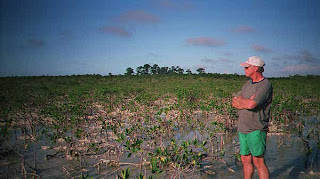Here's a little something from the "All I Know Is..." Department.
Current political correctness, aided by former vice-president Al Gore's documentary An Inconvenient Truth, would have us believe that industrialization is leading to a potentially disasterous climate change.
At the same time many voices are offering a counter-argument that the opposite is occurring, citing examples like the Maunder Minimum.
The picture above is of Big Knockemdown Key, one of the uninhabited Florida Keys. In the background is a stand of pine trees. During the last period of glaciation, which ended about 10,000 years ago, the sea level was substantially lower. What is now Florida Bay was a pine forest. As the sea intruded the area covered with pines became smaller and smaller. Although this species is tolerant of salt air, they will not grow in salt water. Their range was gradually limited to the mainland or to the few offshore islands that had a small freshwater aquifer.
According to botanists the pines pictured above are the descendants of remnants of the original post-glacial pine forest. The pines on each island are autochthonous--descendants of the original pines that were growing on site (as opposed to pines developed from seeds spread by birds or by the wind). Thus they or their descendants had been growing in place for at least 10,000 years.
After Hurricane Wilma passed through the Keys in 2005, the pines all died. So for 10,000 years they had survived countless storms and hurricanes, all of which leads to the strong conclusion that in recent years the sea level has increased slightly, enough to inundate the island during a high-water incident like Wilma to the point that they were killed by salt intrusion.
So I don't really know if we are in a warming phase of a greater overall cooling phase, or if human-generated warming is counteracting a strong overall sun-related cooling phase, or any combination of the above.
All I really know is that now the pines are dead. And they weren't before Wilma in 2005. They had been there for over 10,000 years.
An Update
-
This is Bob's daughter, Susan. In case there are still some visitors
following his blog, I wanted to share the sad news that our Dad passed away
on April 1...
1 year ago




